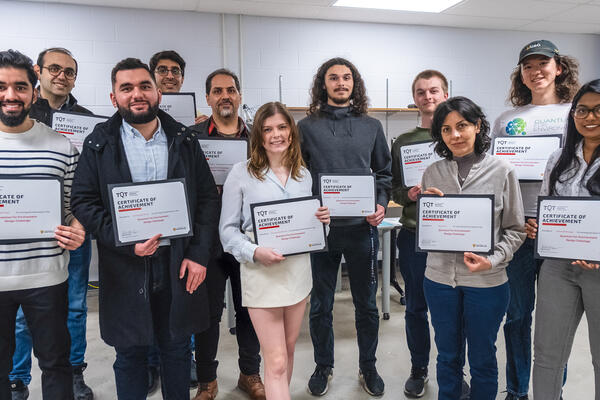
Climate Change: Where should the money go?
Waterloo researchers say international trade will help guide policy makers as global warming threatens traditional economies.

Waterloo researchers say international trade will help guide policy makers as global warming threatens traditional economies.
By Kira Vermond Communications and Public AffairsWhen the world’s policy makers sit down to discuss what should be done about climate change, two words invariably get thrown around: mitigation and adaptation.
But Alain-Désiré Nimubona, an assistant professor in Waterloo’s Department of Economics and Horatiu Rus, an assistant professor in the Departments of Economics and Political Science, believe a couple of other words should be added to the list: international trade.

“We say that international trade will be the tool that we’ll be using to determine if an economy should be investing in adaptation, mitigation or both,” says Nimubona.
No one answer
Mitigation addresses the root cause of climate change by eliminating greenhouse gas emissions in the first place. Citizens are encouraged to walk rather than drive, for example, or companies are given tax breaks for producing green energy.
Adaptation, however, is about finding ways to deal with climate change consequences, whether that’s moving homes away from coastal regions hit by flooding, or focusing a country’s resources on manufacturing instead of agriculture.
Both approaches are needed, says Nimubona and Rus, who are working on a project funded by the Social Sciences and Humanities Research Council of Canada (SSHRC.)
Open for trade
International connections are vital when deciding where a country should spend its money. A country that is closed to trade could find itself vulnerable as it spends the majority of its resources producing what its own citizens need to survive rather than addressing its growing climate change concerns, says Nimubona.
But a country open to trade? It could conceivably find itself spending less on adapting to its changing environment. For instance, rather than focusing on forestry or fishing – two sectors that would be hard hit by a warming climate – it could bolster its tourist sector and import goods from other countries now in a better position to provide them.
While the SSHRC project is still ongoing, the results could ultimately have a real impact on how governments create climate change policy and international treaties. Their data will be vital when projecting what countries will need to do to protect their people and livelihood, five, 10 or even 20 years from now.
“It’s a very complex question to answer. You have to make sure that the different countries are making the right decisions. That’s what we’re trying to help them do,” says Nimubona.

Read more
First-year students hone more than their research skills by exploring what it means to be happy

Read more
12 Waterloo students and postdoctoral fellows receive up to $10,000 in funding to develop their green-tech solutions

Read more
English professor reflects on the innovative field of children’s literature and the challenges of writing and publishing picture books
The University of Waterloo acknowledges that much of our work takes place on the traditional territory of the Neutral, Anishinaabeg and Haudenosaunee peoples. Our main campus is situated on the Haldimand Tract, the land granted to the Six Nations that includes six miles on each side of the Grand River. Our active work toward reconciliation takes place across our campuses through research, learning, teaching, and community building, and is co-ordinated within the Office of Indigenous Relations.